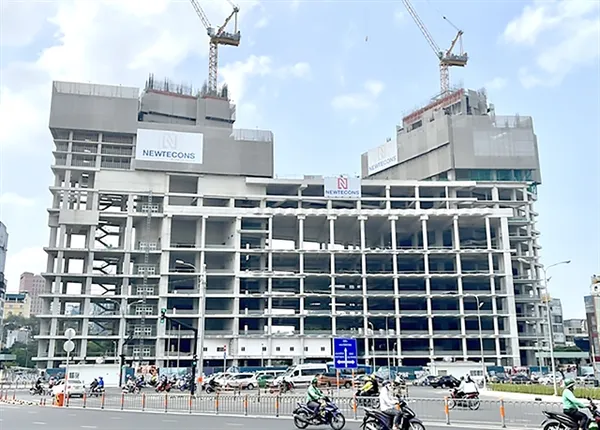 Economy
Economy

 |
| Around VNĐ140 trillion worth of bonds will mature in the second half. VNA/VNS Photo |
HÀ NỘI — Real estate enterprises are facing significant debt maturities of nearly VNĐ59 trillion (US$2.3 billion) and a rapidly rising delinquency rate in the sector.
From the start of 2024 to July 5, the market saw 133 private placements and ten bond public offerings, totalling over VNĐ140 trillion. 65.6 per cent of this value was from the banking sector, while real estate bonds accounted for only 24.6 per cent, or over VNĐ34.5 trillion.
Real estate bond issuance activity picked up in June, with notable offerings from Vinhomes (VNĐ2.5 trillion), Becamex (VNĐ800 billion), Thiên Hà - Băng Dương Construction Investment Company (VNĐ600 billion) and Nam Long Group (VNĐ550 billion).
While real estate bond issuance value has recovered year-on-year, its proportion of total issuances has dropped sharply - from nearly 55 per cent in the first half of 2023 to just 25 per cent in the first half of 2024.
This is concerning, as real estate enterprises are facing significant debt maturities and a rapidly rising delinquency rate in the sector.
In the first week of July, nine companies announced delays in paying the principal and interest on their bonds, along with changes to the bond terms - primarily extending the maturity by 12-24 months. These companies were mostly from the real estate sector, including Novaland, Gia Đức Real Estate Company, Vĩnh Xuân Real Estate Company and Ngọc Minh Real Estate and Investment Company.
This followed a similar trend in June, when numerous real estate enterprises had announced delays in bond payments or requested to restructure their bonds.
In the latter half of 2024, it is estimated that around VNĐ140 trillion worth of bonds will mature, with the majority (nearly VNĐ59 trillion, accounting for 42 per cent) being real estate bonds. This group of real estate bonds is facing the highest debt repayment pressures.
Data from FiinGroup showed that as of May, the delinquency rate on bonds, including corporate bonds that have been restructured, or had their maturity extended, was close to 18 per cent.
For the non-bank corporate bond segment specifically, the rate was nearly 26 per cent. The total value of corporate bonds that are problematic was around VNĐ215 trillion.
The real estate sector has the largest share of delinquent bonds, with the delinquency rate as high as 42.5 per cent. However, encouragingly, in the first five months, the rate of problematic corporate bonds has been slowing compared to 2023.
High-interest loans
In the first half of this year, real estate companies have been actively raising funds by issuing bonds with average yields of 9-12 per cent per annum. These bond issuances have mainly involved large, reputable, real estate developers such as Vinhomes, Nam Long and Khang Điền.
For the high-risk group of real estate companies facing financial difficulties, the bond yields can reach as high as 20-30 per cent, or even up to 50 per cent. These high-yield bonds are typically associated with low-liquidity.
"Real estate companies have faced liquidity challenges since the second half of 2023. As a result, their corporate bonds are being traded with yields as high as 20-25 per cent. These high-yield bonds are typically issued by companies struggling with project execution," analysts from FiinGroup said.
"These companies will be under significant financial pressure over the next 12-18 months and face obstacles in refinancing or raising new capital. This reflects the risk appetite of investors purchasing these high-yield bonds."
The willingness to raise funds through high-interest bonds also suggests these companies are finding it difficult to access bank credit, especially without sufficient collateral or debt repayment capability.
Nevertheless, Nguyễn Đình Duy, a senior analyst at the Vietnam Investor Service (VIS Rating), believes real estate firms will find it easier to access capital in the second half of 2024.
New real estate laws effective August 1, 2024 will help investors resolve land valuation and usage issues, allowing them to secure financing for new projects.
Bond issuances are expected to recover, and real estate lending is forecast to grow 16-18 per cent in 2024. Many listed developers also plan to raise around VNĐ26 trillionin new equity this year.
Duy said that these factors will help alleviate liquidity challenges for investors facing heavy debt maturities in 2024-2025. — VNS




